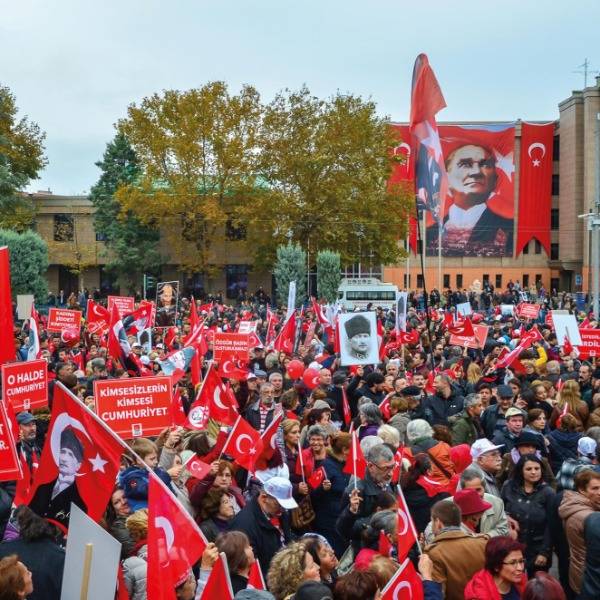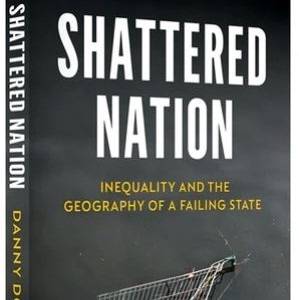.jpg)
This article is a preview from the Winter 2016 edition of New Humanist. You can find out more and subscribe here.
Ece Temelkuran is one of Turkey’s best known political commentators and a prominent critic of the Turkish government. Her new book, “The Insane and the Melancholy” (Zed Books), aims to explain Turkey’s current political turmoil to a global audience, drawing on music, poetry, photographs, stories, history, the media, and everyday conversations.
How do you think Turkey relates, politically and ideologically, to Europe and the Middle East?
Turkey was supposed to be this European, westernised country. Geographically, it’s in a very interesting place: connecting east and west. We were always told by the founders of the Republic to turn our heads to the west. But that plan didn’t really work out. And now the AKP [Justice and Development Party] government is telling us to direct our lives towards the east. It’s like living on a bridge. But you cannot live on a bridge for long. You cross a bridge.
What effect did this year’s attempted coup have?
We know coups quite well in Turkey. This was the second coup in my lifetime. But this one was particularly insane: the [military] bombarded the parliament. That was unthinkable. It was completely devastating and traumatising for everyone. And one of the particularities of this coup was ordinary people in their pyjamas standing up to the soldiers and the army. Which was, again, unthinkable for Turkey, since the army is the most trusted and sacred institution since the founding of the republic.
President Recep Tayyip Erdogan seems even more powerful now. How has he got to this position?
Let’s make one thing clear: he’s not manipulating anything. Firstly, he’s a super brilliant politician. And secondly, [the AKP] was a social and political movement: Erdoğan didn’t do it on his own. There is the capital, and a web of people behind the government. It’s not one man manipulating the masses. The story the western media gives is a simple one, like there is a dictator and the rest of the country is in pain. Actually, there is an elected government, supported by the majority of the people.
The AKP has a project it calls the New Turkey. Can you explain what this means?
It’s a more conservative, Islamic and obedient country.
You note that violence against women in Turkey has drastically increased in recent years. Why?
One can read the situation keeping in mind that there is an Islamisation of the society going on. Also, when the sense of law and justice is damaged in a country, the ones who are most vulnerable are always the first victims of the violence: women and children. Therefore oppression and violence come into our daily lives. Ideology gets into the very personal sphere of your life, changing the value system of intimate relationships. Violence against women is the outcome of this massive change.
These processes go beyond the current government. How did the coup of 1980 – which succeeded – change Turkey, for example?
Religious lessons became obligatory, and Islamic sects were supported by the state to counter the threat of Communism. In a way, the coup of 1980 helps to explain why Turkey is now such a conservative and obedient society.
Your book discusses how Armenians were massacred and driven out of Turkey in 1915. Is there a kind of collective amnesia about these events, and do you see it elsewhere in public life?
Every nation state has a record of changing the story. You either do this in a sophisticated way, or you can do it in a very clumsy way. In Turkey we do the latter. We say: forget about it and shut up. In recent times this rewriting of history has been done on a daily basis. So you see journalists, for example, talking about incidents you have seen with your own eyes, in a completely different way. It’s a very serious problem.
At the end of the book you leave an open-ended question: “what will become of this land of ours?” Have you thought about the answer?
Right now, Turkey is changing. And when a country changes in such a drastic fashion, there are always emotional consequences for the entire society. So nobody knows what’s going to happen. But obviously it’s going to get even more complicated because of the regional problems as well.
The Middle East is riven by conflict. What is next?
The most tragic thing is that whatever happens – even if the peace does come back – all these places and people are ruined. So there will be another Syria or another Lebanon, which will turn out to be worse versions of themselves. That is very sad. These are people who can create, and who love life and their children. They are all swept north, with their broken dignities. Even if they are alive, they are like the living dead.
What is the situation for free-thinkers in Turkey?
I think there is an anti-intellectual and anti-art trend going on in the world right now. You hear similar words from Donald Trump, and other world leaders in the rising right wing. And we are witnessing the first symptoms of it in Turkey. This government created its own capital, its own bourgeoisie and its own propaganda machine. So now, understandably, they now want to create their own culture and arts. It’s most likely they will succeed too.
Will the artistic and cultural life of Turkey change?
I suspect it will be more conservative. But then again, there have always been struggles for freedom in Turkey. And the country has never exactly been a heaven for journalists, freedom fighters, writers or intellectuals. But they always existed, and they still do.
Turkey is one of the world’s leading jailers of journalists. Do you ever feel at risk?
I would rather not think about it. I wrote what I think is a fair book, so I have to stand by it.
What kind of secular spaces in public life would you like to see preserved?
Turkey has never been easy for progressive intelligentsia. They have never been influential in state matters or never part of the political power. However they at least had a space to grumble. My expectations are quite low at the moment. I want to see a space, at least, to grumble.

